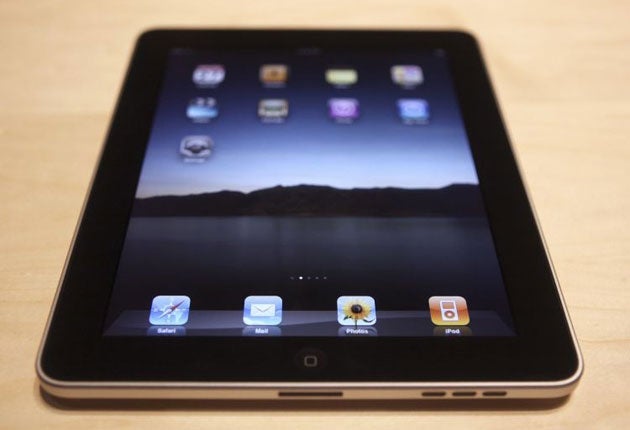The knives are out for the iPad

Your support helps us to tell the story
From reproductive rights to climate change to Big Tech, The Independent is on the ground when the story is developing. Whether it's investigating the financials of Elon Musk's pro-Trump PAC or producing our latest documentary, 'The A Word', which shines a light on the American women fighting for reproductive rights, we know how important it is to parse out the facts from the messaging.
At such a critical moment in US history, we need reporters on the ground. Your donation allows us to keep sending journalists to speak to both sides of the story.
The Independent is trusted by Americans across the entire political spectrum. And unlike many other quality news outlets, we choose not to lock Americans out of our reporting and analysis with paywalls. We believe quality journalism should be available to everyone, paid for by those who can afford it.
Your support makes all the difference.There's no pleasing a nerd. Whether it’s the launch of a highly-anticipated handheld computing device, or the casting of the latest Spider-Man movie, they will always find something to complain about.
In the case of the Apple iPad, the blogosphere speculated for years about its potential brilliance; mouthwatering details of its specifications leaked out steadily; and technology sites guessed exactly what it would do and almost exactly how it would look.
Yet as soon as Steve Jobs unveiled it on Wednesday, hoots of derision echoed across the web, despite the fact that the iPad looks fabulous, performs almost every task previously predicted by the expert Apple-watchers, and at about half the expected price.
And so a legion of disgruntled, disenfranchised bloggers, YouTube users and message board flame warriors have turned to the one forum in which they can plausibly exert any influence over Steve Jobs’ supremely confident state of mind: the internet.
Before the Apple CEO’s keynote address was even over – and long before any member of the public gets hold of one – the iPad had been mocked for being little more than a giant iPhone without the capacity to make phone calls, its name described as better suited to a brand of sanitary towels.
Soon enough the Photoshoppers had swung into action, producing a picture of Jobs holding up a handful of iPhones stuck together with gaffer tape, and a mock-up of the Apple home page, the word “iPad” substituted with “iLame”.
Overnight, these lo-fi responses to the launch were joined by more sophisticated parodies. Satirical website The Onion was well prepared with a hilarious headline: “Frantic Steve Jobs stays up all night designing Apple Tablet”. Comedian Peter Serafinowicz produced his own version of Apple’s corporate video to advertise the iPad, featuring a 100-page pad of A4 paper.
And, inevitably, within 24 hours there was an iPad edition of the web’s most resilient meme: the Hitler scene from the film Downfall, which has already been used to mock everyone from Hillary Clinton to Giles Coren. In this version, the Fuhrer rails at his generals after they inform him that the iPad can only run one application at a time – a major flaw which it shares with the iPhone.
The hype and backlash rollercoaster is standard operating procedure for geeks observing any major product launch. Take Avatar, for instance. The director James Cameron – a creator with the same tyrannical reputation as Jobs – granted audiences an early glimpse of footage from his hugely hyped movie months in advance.
The web erupted with disdain (and an Avatar version of the Hitler clip was duly disseminated). But when the finished film arrived in cinemas the same sci-fi fans adored it. Avatar still has its detractors, but that hasn’t stopped it becoming the highest-grossing movie in history.
The same is true of almost every Steve Jobs product launch, including his greatest triumphs. The iPhone was initially greeted with a collective shrug, but iPad’s detractors would do well to remember that the device’s revolutionary power only became apparent once it had reached consumers.
The iPhone App Store, for instance, began as a side project but has now generated more than three billion downloads. Meanwhile, archived message boards still exist from the time of the iPod’s launch in 2001, on which Apple fans filed near-sighted complaints such as this, from user WeezerX80: “All this hype for something so ridiculous! Who cares about an MP3 player?”
Join our commenting forum
Join thought-provoking conversations, follow other Independent readers and see their replies
Comments